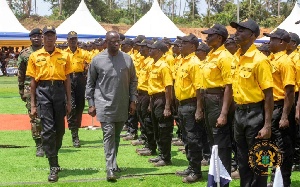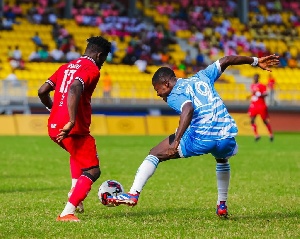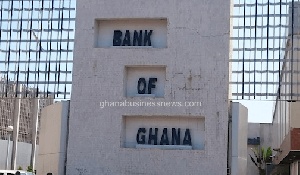- Home - News
- Elections 2024
- News Archive
- Crime & Punishment
- Politics
- Regional
- Editorial
- Health
- Ghanaians Abroad
- Tabloid
- Africa
- Religion
- Photo Archives
- Press Release
General News of Wednesday, 16 April 2025
Source: www.ghanawebbers.com
CIMAG hails commissioning of 453 Blue Water Guards; calls it a milestone for Ghana’s maritime security and environmental sustainability
The Centre for International Maritime Affairs, Ghana (CIMAG) is a leading think tank. It focuses on sustainable maritime governance, security, and economic development. CIMAG recently celebrated the commissioning of 453 Blue Water Guards. The Minister for Lands and Natural Resources, Hon. Emmanuel Armah-Kofi Buah, led the event at the Naval Operating Base in Ezinlibo. This initiative aims to protect Ghana’s river systems and strengthen maritime security.
The Blue Water Guards will work with the Ghana Navy. They will patrol key waterways like the Pra, Ankobra, and Birim. Their mission is to combat illegal mining, known as "galamsey." This activity has polluted rivers and harmed ecosystems. It also threatens the livelihoods of millions of Ghanaians.
Addressing this crisis protects Ghana’s environment and supports national development. CIMAG promotes research and advocacy to highlight these issues. The Blue Water Guards play a crucial role in enforcing laws and restoring ecosystems.
Ghana's inland waterways are vital for communities. They support agriculture, fishing, and transportation. However, illegal mining has caused severe damage to these resources. Heavy metals like mercury contaminate water sources and harm public health. Protecting clean water bodies is essential for food security and economic stability.
This initiative aligns with CIMAG’s goals for integrated maritime governance. By tackling galamsey, the guards help Ghana meet international standards like UNCLOS. These frameworks promote sustainable resource management in regional maritime stewardship.
The training of the 453 guards reflects CIMAG's commitment to capacity-building. They learn skills in riverine operations, environmental monitoring, and community engagement. This approach ensures they are not just enforcers but also partners with local communities.
CIMAG’s Executive Director Mr. Albert Derrick Fiatui praised this program's design. He stated that it embodies Ghana’s commitment to a secure maritime future. The initiative balances enforcement with community empowerment while protecting livelihoods.
Clean waterways are crucial for agriculture and fisheries in Ghana. These sectors employ over 40% of Ghanaians and contribute significantly to food security and exports. By reducing illegal mining activities, the Blue Water Guards help preserve these industries.
Additionally, this proactive stance enhances Ghana's reputation globally in maritime forums. It may lead to partnerships or funding for green initiatives as well.
Illegal mining often connects with other illicit activities like smuggling that destabilize regions. The guards’ patrols will improve surveillance against such threats while reinforcing maritime awareness.
To ensure success, CIMAG recommends several actions:
1. Equip guards with modern tools like drones and patrol boats.
2. Expand community programs focusing on alternative livelihoods.
3. Use technology such as satellite monitoring for real-time tracking.
4. Strengthen legal frameworks by fast-tracking prosecutions of offenders.
5. Collaborate regionally with neighboring countries on cross-border issues.
As the Blue Water Guards begin their mission, CIMAG commits to supporting them through policy analysis and workshops. They will monitor progress and provide recommendations based on evidence gathered during implementation.
CIMAG plans an upcoming policy brief titled “Securing Ghana’s Rivers: A Blueprint for Maritime Sustainability.” This brief will feature the Blue Water Guards as a case study in innovative governance.
CIMAG urges all Ghanaians—citizens, businesses, civil society—to support this initiative together as a shared responsibility transcending politics or borders.
Today marks more than just an event; it signals a call for a greener Ghana focused on sustainability and security in its waterways.











